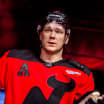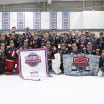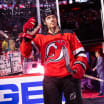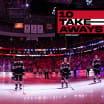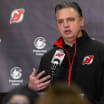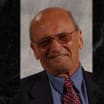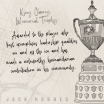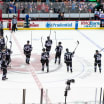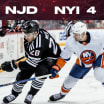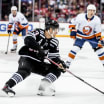When Dr. John McMullen became the first owner of the New Jersey Devils in 1982, he instantly knew that his club's keenest rival camped across the Hudson on Seventh Avenue in Manhattan.
"The question is," Doc Mac wondered, "was how fast will our rivalry with the Rangers develop?"
Some journalists will tell you it happened in record time. Others will note that it took a bit longer.
Perhaps the best analysis was provided by current Minnesota Wild general manager Bill Guerin. A Devils rookie in 1991, Guerin put it straight to author Tim Sullivan in Sully's fine work, Battle On The Hudson.
Guerin: "They were New York. We were New Jersey. They were established. We weren't. There was always a feeling that if we're going to do anything in this league we're going to have to go through them. They were our biggest rival."
DEVILS OVER THE DECADES: Ch. 8 - Birth of a Rivalry
Stan Fischler writes about the beginnings of the Devils-Rangers rivalry in Chapter 8 of Devils Over the Decades
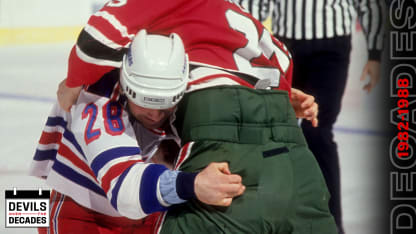
PREVIOUS ARTICLES
PAST CHAPTERS
Ch. 1 - The Birth of Hockey in Jersey
Ch. 2 - How it all Began
Ch. 3 - The First Devils Roster
Ch. 4 - The Milestone First Season
Ch. 5 - The Great Gretzky Uproar
Ch. 6 - Getting Even with Gretzky
Ch. 7 - A New Coach, A New Era
Ch. 8 - The Birth of a Rivalry
Ch. 9 - A Showdown Season
Ch. 10 - Carpenter's Last Stand
Ch. 11 - Enter Lou, Enter Changes
Ch. 12 - Exit Carpenter, Enter Schoenfeld
Ch. 13 - Devils Over the Decades
Ch. 14 - The Hot Homestretch
Ch. 15 - Showdown with the Rangers
Ch. 16 - A Classic Win
Ch. 17 - Playoff Bound - Almost!
Ch. 18 - First Playoff Berth
Ch. 19 - First Playoff Win
Ch. 20 - Washing the Capitals
Ch. 21 - Meadowlands Melodrama
Ch. 22 - Goodbye Caps, Hello Boston
Ch. 23 - Taking on the Bruins
Ch. 24 - Yellow Sunday in East Rutherford
Ch. 25 - Close but no Cigar
Ch. 26 - Best Devils Quotations
Ch. 27 - Build-Up to a Letdown
Ch. 28 - The Russian Invasion of New Jersey
Ch. 29 - Slava and Sergei Arrive
Ch. 30 - Evolution of the Russians
Ch. 31 - 1990s Playoffs or Bust
Ch. 32 - Adding Muscle on top of Muscle
Ch. 33 - Coaching Change; Cunnif to McVie
Ch. 34 - McVie for Victory
Ch. 35 - Bring on the Penguins
Ch. 36 - Chasing the Elusive Penguins
Ch. 37 - Building a Champion - Get Stevens!
Ch. 38 - Explosive Devils of 1991-92
Ch. 39 - Breezing Along with the Breeze
STANLEY CUP WINS
2003 - Devils Stanley Cup Run
2000 - Lucky Seven
2000 - Winning in Dallas
1995 - Built off a Lockout, Cup Champs
SPECIAL EDITIONS
Devils Cavalcade of Coaches
Coaches Sidebar
Best Devils Quotations
WHAT'S NEXT
A new Devils Over the Decades article will be published every Tuesday, Friday and Sunday morning. Check NewJerseyDevils.com to continue reading!
For ignition of the rivalry, McMullen didn't even have to wait for his first training camp to open in September 1982. Months earlier he had to pay the Rangers -- as well as the Islanders and Flyers --for the right to move to New Jersey.
But it was the Rangers that Doc Mac resented most and he expressed that dislike in various ways. As for the Blueshirts, McMullen made a classic request of his play-by-play man, Larry Hirsch. Those choice words were articulated in author Matthew Blittner's book Unforgettable NJ Devils.
Hirsch: "John McMullen hated the Rangers. He wanted nothing to do with the Rangers. He told me that if I so much as mentioned the Rangers, I'd be fired. In New Jersey, he wanted to create his own thing.
"He told me: 'Larry, I don't want to hear anything about the Rangers on your broadcasts.' Yes, sir!" At the end of the year, we were Number One in the ratings."
Actually, it was hard not to discuss the Broadway Blueshirts. While the Devils were struggling to win games in their maiden season, the Rangers -- under Olympic hero Herb Brooks -- had become an exciting sextet.
Yet when the Devils, coached by Billy MacMillan -- he also was general manager -- hosted Brooks & Company on October 8, 1982, the final score, 3-2 for New Jersey, seemed more like something out of a science fiction flick.
The Devils not only beat Brooks' Blueshirts but unveiled an instant fan favorite in goalie Glenn (Chico) Resch who made 21 of 23 saves.
Chico had a healthy hate on for the Rangers from his days as a New York Islander. No Devil exulted more when it came to beating the big-shots from The Big Apple than Resch. He made that clear in Unforgettable NJ Devils.
Resch: "That win was as special as any that I had with the Devils because we beat the Rangers and it solidified our fan base. It got them excited. Got my teammates excited too.
"Our guys realized that if we wanted to get respect early on, beating the Rangers was a good way to do it."
That it was, but the euphoria didn't last long. The man who became revered as "Mister Devil," Ken Daneyko, was a raw rookie in 1982. Beating the Rangers gave him a thrill, but looking backward he was more apt to wince than smile.
"Over that season, we were a mess," said Daneyko. "We had a lot of learning to do; a lot of growing. Most people around the NHL thought we'd never reach our potential."
But they did although it was a slow -- almost agonizing -- process What proved a balm was any win over the New Yorkers. Or course, some wins over the Blueshirts were better than others, especially in those early years.
Broadcaster Hirsch remembers one such triumph that had him, literally, going nuts because of the acute, building melodrama. The game took place on November 2, 1985, at Byrne Arena.
With about eight minutes left in the third period, the game looked in the bag for the Visitors. It was 5-2 for New York. Hirsch, like everyone else in the building, could not imagine what soon would happen, not in his wildest dreams.
Here's how he described it to author Matthew Blittner: "Then the Devils score, it was 5-3. They scored again, 5-4. Now I'm saying,'Hey, we can pull the goaltender.' And while I'm building this scenario, the coach of the Rangers, Ted Sator, did the most amazing thing.
"After we made it 5-4, he pulled his goalie, Terry Kleisinger, and put in the second-stringer, John Vanbiesbrouck, to change the pace and slow the game down."
Like many broadcasters, Hirsch was broadcasting as if he were a fan. Sure enough, Tim Higgins scored for New Jersey with 32 seconds remaining in the third period. The crowd roar virtually drowned out Hirsch's call but there still was overtime to be played.
Hirsch: "Right from the O.T. face-off, Peter McNab gave the puck to Mel Bridgman from the right circle. Bingo, 6-5, game over! At that point I was in such a lather, I was at such a peak when I called the goal. Do you know where I ended up? I literally climbed up on the seat on the table in the Meadowlands press box, my hands were spread out.
"I was pumping my fist. I was standing up on the table and fans were looking at me. It was a moment of insanity, but it was one of those moments in hockey where you just let it all out."
Exhausted, Hirsch eventually returned home and turned on the tv news just in time to hear CBS sportscaster Warner Wolf describing the Devils win over the Rangers. After showing the winning goal, Wolf then further arrested Hirsch's attention.
"Warner then started talking about my reaction," Hirsch remembered. "He said 'If you think the crowd is going crazy you should see the Devils announcer.' They showed me up on the tables, my hands spread out and everything like that for everybody in New York to see."
Rangers fans took a dim view of Hirsch's antics yet the Blueshirts Faithful still remained secure in the knowledge that the Devils were far from being a playoff contender.
What disturbed McMullen about the rivalry was the fact that so many New Jersey-based hockey fans refused to take the state's NHL team to their bosoms. On any given night when the Rangers were hosted in East Rutherford, at least half the audience was rooting for the Blueshirts.
When a reporter asked Doc Mac for an explanation why so many Jerseyites continued to root for the Manhattan team, his response was, "It's genetic."
Author Tim Sullivan did notice a slight change of fandom affection toward the newcomers; but it required a few years' time.
"There were some converts, clearly," wrote Sullivan. "The Devils presence for many New Jersey hockey fans, meant a more affordable, way of seeing the sport they loved."
Those early victories over the Cross-Hudson rivals created interest among previously dis-interested media names. One of them was WFAN's Chris (Mad Dog) Russo co-star of the Mike And The Mad Dog show.
" At first," Russo remembered, "the Devils were an easy target. But (with wins over the Rangers) they started a process of gaining respect."
It was a slow process -- too slow to suit Dr. McMullen -- but it finally would reach fruition in 1988.
Meanwhile, the Mickey Mouse imagery still was hard to shake. In fact it wasn't until the arrival of Lou Lamoriello -- like the legendary Lochinvar riding to the rescue -- that the Devils once and for all destroyed the Rangers.
LISTS: FOUR KEY CHARACTERS WHO HELPED REINFORCE THE DEVILS IN THE GROWING RIVALRY WITH THE RANGERS:
1. GLENN RESCH: Having beaten the Blueshirts enough during his days as an Islander, goalie Chico knew how to deflate the Manhattan-ites with his pads and his palaver.
2. LARRY HIRSCH: A budding franchise needs a rah-rah play-by-play man and Larrupin' Larry filled the bill to a "T," as in terrific. His overtime call on Mel Bridgman's winner against the Rangers became an instant radio legend.
3. RICH CHERE: Having a first-rate newsman covering the team is an immense asset. Newark Star-Ledgerbeat man, Chere, covered every Devils-Rangers game. His stories gave the newcomers a touch of class in the tough early years.
4. JOHN MCMULLEN: A decorated Navy hero in World War II, Doc Mac's toughness as a leader of men and commander of his team was the kind of beautiful branding that diminished any of the Rangers superiority on the ice.
(NEXT WEEK: THE CRUCIAL (1985-86) SEASON FOR DOUG CARPENTER AND CHICO RESCH)

